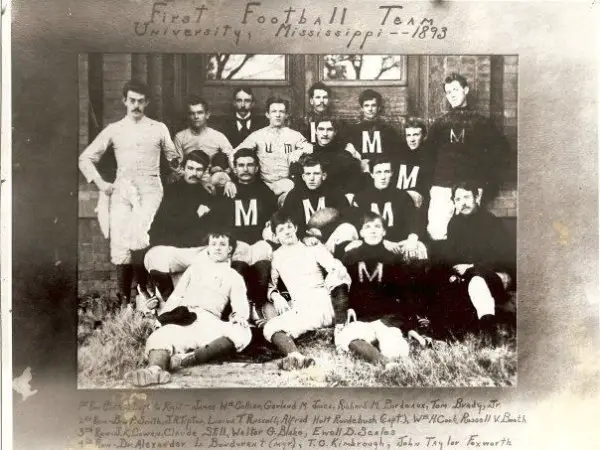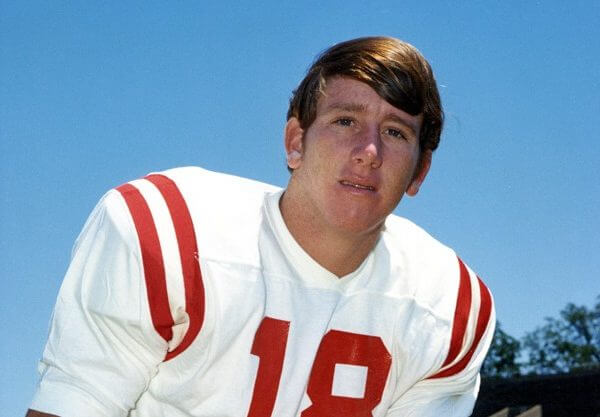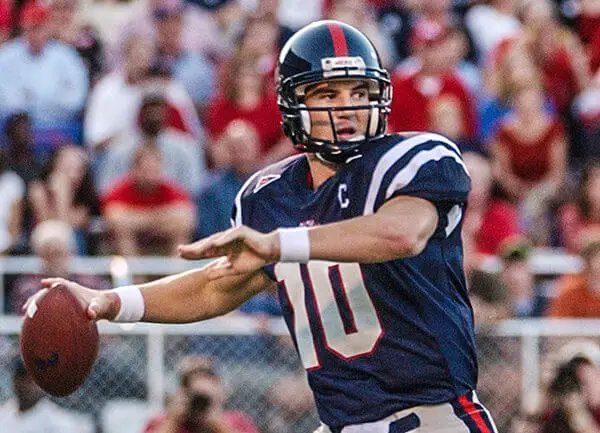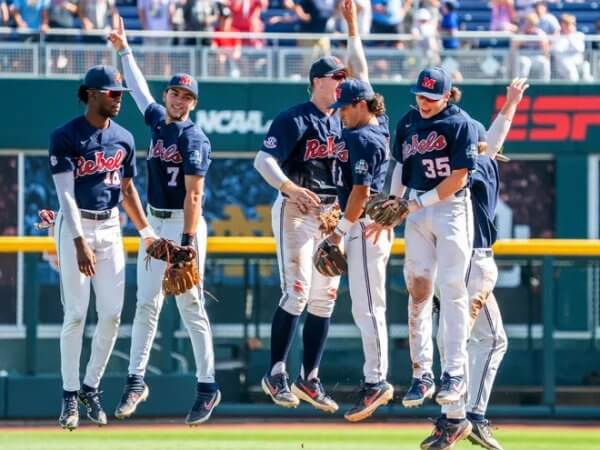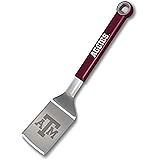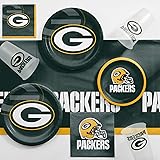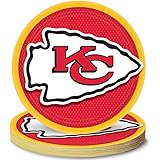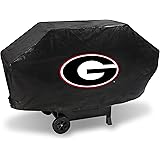
College Sports Established
1898
Location
Oxford, Mississippi
College Name
University of Mississippi
Collegiate History
1973 - Present / NCAA Division 1
1921 - 1973 / University Division of the NCAA
1907 - 1921 / Athletic Association of the United States
Conference History
1932 – Present / SEC Conference
1922 - 1932 / Southern Conference
1898 – 1921 / Southern Intercollegiate Athletic Association
Nickname
Rebels - The Ole Miss Rebels are one of the nation's most storied college football programs, and their nickname has an exciting history. The original name for the team was "Mississippi Flood," a reference to flooding that had recently occurred in Mississippi at the time. However, this didn't sit well with many people who felt linking natural disasters with sports teams was inappropriate.
In 1936, Colonel William Crenshaw suggested changing the name from “Flood” to “Rebels” to honor Confederate veterans who fought during America's Civil War. This suggestion quickly gained traction among students and alumni alike, and soon enough, they were officially known as "Ole Miss Rebels."
Since then, Ole Miss has embraced its Rebel identity by using imagery such as confederate flags on uniforms or mascots dressed up like Confederate soldiers at games - something which is often seen by some fans today despite criticism from those outside of Mississippi about these symbols being associated with racism or white supremacy movements.
Nevertheless, regardless of your opinion on these controversial topics, there can be no denying that when it comes down to athletics, nothing quite compares with cheering for your beloved team – especially if you're an Ole Miss fan! So next time you hear someone talking about why they love their school so much, remember: It all started in 1936 when Colonel William Crenshaw proposed changing their nickname from 'Flood' to 'Rebels.'
NCAA Championships
Baseball 1
2022
Men's Basketball 0
Women's Basketball 0
Football 0
Soccer 0
- 1893
- 1936
- 1956
- 1970
- 2003
- 2021
- 2022
-
first football team at the University of Mississippi is formed
In 1893: The first football team at the University of Mississippi is formed. -
The team is officially nicknamed the Rebels
In 1936, the Ole Miss Rebels football team underwent an important change as they officially adopted the nickname “Rebels.” This marked a significant moment in the team’s history, solidifying their identity and establishing a lasting tradition. During the 1936 season, the Ole Miss Rebels competed in college football under the leadership of head coach Harry Mehre. Mehre, who had been ... -
Baseball team wins its first SEC championship
In 1956: The Baseball team wins its first SEC championship and makes its first College World Series appearance, finishing third -
Ole Miss – Archie Manning
Manning attended the University of Mississippi in Oxford and was the starting quarterback at Ole Miss for three years. In the first national primetime broadcast of a college football game (1969), Manning threw for 436 yards and three touchdowns, also rushing for 104 yards, in a 33–32 loss to Alabama. However, the rest of the team was not at his ... -
Eli Manning – Ole Miss Rebels
Manning started off his senior season with a 2–2 record. He played well in that stretch with 1,329 passing yards, 11 touchdowns, and four interceptions with victories over Vanderbilt and Louisiana-Monroe but losses to Memphis and Texas Tech. The Rebels went on a six-game winning streak that included victories over major SEC opponents #24 Florida, Alabama, #21 Arkansas, South Carolina, and Auburn. ... -
Baseball team wins its tenth SEC championship and makes its eighth Super Regional appearance
In 2021: The Baseball team wins its tenth SEC championship and makes its eighth Super Regional appearance but falls short of the College World Series -
First NCAA Championship for Ole Miss in Baseball
In 2022, Ole Miss won the College World Series in a 2-0 series against Oklahoma. Ole Miss sweeps Oklahoma to claim the first baseball national championship in program history.
To qualify as the greatest player for this team, the player must have played one season for this team. If not, we will remove the player.
* verifies that player has played for this team as an added player by a fan.
History of the Rebels
Off the field is where Ole Miss has made its mark, though. The school was one of the first to integrate college athletics when it allowed African American players to join its football team in 1966 after years of protest by students on campus. This courage set off a chain reaction that would eventually lead to other schools across America following suit with their integration efforts throughout collegiate athletics.
In addition to their accomplishments on defense during these early days of integration, such as winning SEC titles from 1947 through 1963 under legendary head coach Johnny Vaught, they also produced several high-profile offensive stars like Archie Manning, who led his 1969 squad all way up until 1970's Cotton Bowl victory over Arkansas which capped off an undefeated season for him at quarterback before he went onto become an NFL Hall Of Famer with New Orleans Saints.
Beyond just football, there are plenty more achievements worth mentioning too! In basketball, the men’s program won two national championships back–to–back seasons( 1959 &1960 ), while women’s teams have been successful both indoors & outdoors, having earned numerous conference crowns along with multiple trips deep into NCAA tournament play since the 1980s era. From baseball, softball, soccer, or golf, no matter what sport you're looking at, there are plenty of reasons why Rebel fans can be proud!

